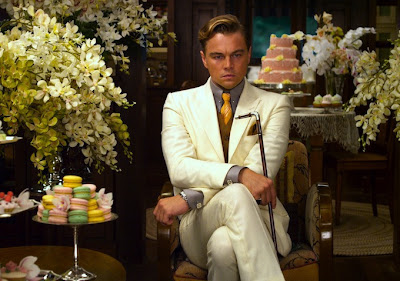Jun 5, 2013
The Great Gatsby
If only all Cliff Notes were like this! I realized halfway through Baz Luhrmann's version of the novel by F. Scott Fitzgerald, that if Luhrmann and producer Jay Z are able to interest young people who don't read books in this quintessential American classic, even if that means adding a hip-hop/roaring twenties mashup soundtrack (mostly quite good) and a generous dash of vulgar glitz, so be it. But that's because the second half of this movie is so much better than the first. The first half of this spectacle is hard going, since Luhrmann seems to have made "Great Gatsby: The Rollercoaster".
The camera never stops to register anything of note, not the expressions in the actors' faces or even the busy minutiae of the production design. My heart sank at the tackiness. Everything looks like painted cardboard, cheap and vulgar, except for the costumes, particularly the men's, by Catherine Martin. Worse, everything looks like Disneyland. And everything is needlessly busy, since it is designed for 3D, a preposterous decision. I did not see the movie in 3D (go ahead, sue me), so certain gestures are too literal, like Gatsby (Leonardo DiCaprio) reaching his hand out on cue towards the water as he pines for Daisy Buchanan (Carey Mulligan). I winced and groaned at the lack of subtlety, and at some of the overblown choices, like introducing Gatsby to the strains of George Gershwin's majestic Rhapsody in Blue. There is nothing wrong with that music, but it refuses to be relegated to background noise (as Woody Allen brilliantly understood in the opening credits of Manhattan). Either you pay attention to it, or to the film. This haphazard chaos happens a couple of times with Lurhmann's sometimes clumsy assault on the senses, but then something mysterious happens. Once the story gets going, the movie settles down and gets out of the way. And what emerges is a hard, sparkling diamond of a story. A brutally sparse and elegant tale, exquisitely told by Fitzgerald's words, used to good effect, even as they are splattered across the screen, about the lunacy of American self-invention and optimism, and about the superficiality of money. It's as if the story is too powerful to let Lurhmann ruin it, and he shows some skill and restraint (of sorts) once things get dramatic.
DiCaprio brings a feral hunger to his portrayal of Jay Gatsby which completely jells with Nick's description of him as a striver. Everything is there: his trying too hard, his insecurity (a bit hammed up), the mystery that belies less of a mystique and more of a prosaic secret. He is very good (I bet he will get no respect) and he looks chiseled and dreamy in those magnificent suits. The rest of the cast is good too. Carey Mulligan tends to always be good in everything, but I thought she was too elegant for Daisy, who should be a slightly vapid airhead. Joel Edgerton and Jason Clarke play their American characters with vigor, and Isla Fisher is wasted in a small part as Myrtle. The formerly unknown Elizabeth Debicki has a star-making turn as Jordan Baker. But everybody in the background seems wrong, over the top, including Amitabh Bachchan as Meyer Wolfsheim, a Jewish prohibition gangster.
As for the preposterous idea that Nick Carraway wrote The Great Gatsby as he recovered from all that partying in a sanatorium, I found it more literal than offensive. I wish that McGuire would have shown more of Nick's crush on his cousin Daisy, and little more edge in general, since he is an outsider sharply observing the rich and the consequences of their behavior. For most of the movie he's just happy to string along with ever-widening innocent eyes. There should be more of a slow simmer to his gathering outrage. Still, this movie is much better than the pallid, boring 1974 version with Robert Redford and Mia Farrow, yet it made me wish that one day someone is going to come along and finally get it right.
Subscribe to:
Post Comments (Atom)

No comments:
Post a Comment